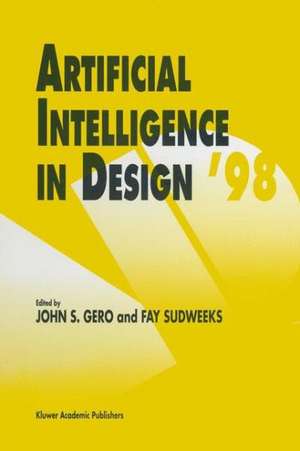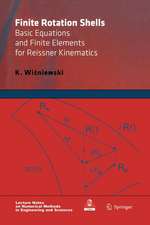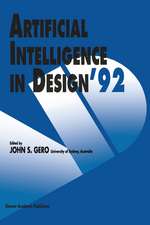Artificial Intelligence in Design ’98
Editat de John S. Gero, Fay Sudweeksen Limba Engleză Paperback – 6 noi 2012
Preț: 352.02 lei
Preț vechi: 440.02 lei
-20% Nou
Puncte Express: 528
Preț estimativ în valută:
67.36€ • 70.33$ • 55.62£
67.36€ • 70.33$ • 55.62£
Carte tipărită la comandă
Livrare economică 15-29 aprilie
Preluare comenzi: 021 569.72.76
Specificații
ISBN-13: 9789401061537
ISBN-10: 940106153X
Pagini: 692
Ilustrații: X, 681 p.
Dimensiuni: 160 x 240 x 36 mm
Greutate: 0.96 kg
Ediția:Softcover reprint of the original 1st ed. 1998
Editura: SPRINGER NETHERLANDS
Colecția Springer
Locul publicării:Dordrecht, Netherlands
ISBN-10: 940106153X
Pagini: 692
Ilustrații: X, 681 p.
Dimensiuni: 160 x 240 x 36 mm
Greutate: 0.96 kg
Ediția:Softcover reprint of the original 1st ed. 1998
Editura: SPRINGER NETHERLANDS
Colecția Springer
Locul publicării:Dordrecht, Netherlands
Public țintă
ResearchCuprins
1 Frameworks for AI in Design.- Towards a knowledge level theory of design process.- Designing with the Activity/Space ontology.- Model-based reconfiguration.- 2 Object Representation in Design.- Managing conceptual design objects: An alternative to geometry.- Multiple perspectives of design objects.- Object representation and reasoning using halfspaces and logic.- 3: Knowledge Representation in Design.- Strategic knowledge in compositional design models.- Representation of embedded engineering knowledge for design.- Shape pattern recognition using a computable pattern representation.- 4: Foundations for Design Tools.- Typological knowledge acquisition through a schema of generic representations.- Cognitive theory as a guide to automating the configuration design process.- Analysis of cognitive processes of a designer as the foundation for support tools.- 5: Designing Using Constraints.- A MAD approach for solving part-selection problems.- Topological enumeration heuristics in constraint-based space layout planning.- A constraint-based approach to supporting conceptual design.- 6: Case-Based Design.- Towards mechanical design object reuse: The description, retrieval and classification of cases.- Topological pattern and geometric shape matching for layout case retrieval.- Exploiting similarity theory for case-based reasoning in real-valued engineering design problems.- 7: Languages and Design.- Generating structural essays from languages of discrete structures.- A framework of multilingual representation of a design world on the basis of philosophy of language.- Aspects of a language model for designing.- 8: Design Support.- Method-specific knowledge compilation: Towards practical design support systems.- Mapping between product structures: Supported by computer during the conceptual design of production machines.- A features framework for architectural information: Dynamic models for design.- 9: Exploration in Design.- Supporting explorative configuration.- Designing a shape grammar: Problems of predictability.- A preliminary investigation of design simplification by analogy.- 10: Agent-Based Approaches to Design.- Information and knowledge sharing for distributed design agents.- Distributed agents supporting event-driven design processes.- A-Design: Theory and implementation of an adaptive, agent-based method of conceptual design.- 11: Collaboration and Concurrent Engineering in Design.- Supports for information and communication in a collaborative building project: An information, communication and collaboration system for the Swiss AEC industry.- Adaptive retrieval and presentation of information in preference-influenced collaborative design environments.- A concurrent engineering approach for supporting weld product design at early stages of the design process.- Artificial neural network-based approach for design of parts for cellular manufacturing.- First author electronic addresses.- Author index.





















